Bezos Takes Quick Ride on Big Phallus
July 21, 2021: Related: 33 million Americans don’t have health insurance. Also: local woman might get fired + local woman gets promoted + Durham library (finally) opens + the dirty part of clean cars
+5 BIG STORIES
1. Jeff Bezos Went to Space in, Uh, This Thing
Cue the overcompensation jokes.





The head detached from the shaft—I mean, the capsule detached from the rocket—at about 47 miles up, and both coasted past the 62-mile marker generally considered the beginning of “space.” That’s higher than the Virgin Galactic flight went, so there.
The entire flight, from takeoff to landing, lasted 10 minutes and 10 seconds.
Bezos, proud union-buster, then demonstrated how out of touch he really is:
After Jeff Bezos returned from his brief flight to space on Tuesday in a rocket built by his private space company, Blue Origin, he made remarks that drew attention to the vast wealth the company had created for him.
“I also want to thank every Amazon employee and every Amazon customer because you guys paid for all of this,” Mr. Bezos said during a news conference after his spaceflight. …
“While Jeff Bezos is all over the news for paying to go to space, let’s not forget the reality he has created here on Earth,” Representative Nydia Velazquez, Democrat of New York, said on Twitter. She added the hashtag #WealthTaxNow on Tuesday morning and included a link to an article about how much Amazon’s employees had been paid.
As a reminder: Amazon workers labor under notoriously grueling and dangerous conditions. But hey, at least the ex-boss thanked them for sending him to space.
Some relevant stats:
According to the CDC, 12% of Americans under the age of 65 do not have health insurance. Nearly 14% of Americans live below the poverty line, according to the Urban Institute. Nearly 11 million children live in poverty.
It would cost an estimated $30 billion a year to end world hunger.
Bezos is worth more than $210 billion. Earlier this month, he made $8.4 billion in one day.
Yeah, but: Bezos is fascinated with space. He’s a Trekkie. He was behind Amazon Prime’s decision to save The Expanse—the best sci-fi show in at least a decade—from cancellation. I get it. If I had fly-to-space money, I’d probably build a rocket, too. It’s vainglorious, sure, but it’s not merely a vanity project. There are so many scientific advances that might come from a robust space program, even if it’s for-profit.
What bothers me isn’t necessarily that Bezos went to space—or, rather, founded a space company—while there are pressing terrestrial needs. It’s that he, like most very rich people, benefits from a tax structure that encourages not just obscene wealth but obscene wealth disparities.
Bezos says he spends $1 billion a year on Blue Origin.
From 2014–18, Bezos paid a real tax rate of less than 1%, according to ProPublica. In that period, he paid less than $1 billion in taxes, while his wealth skyrocketed by nearly $100 billion.
2. The Raleigh Recall Is On
I’ve been ruminating on this half-baked pitch for a Mary-Ann Baldwin magazine profile. The gist is simple, maybe too simple. The Raleigh mayor is exactly who you expected her to be. For better and worse.
MAB pushed through sweeping, pro-density changes to the Unified Development Ordinance, just like she promised.
She passed an affordable housing bond, just like she promised. (It wasn’t as big as it needed to be, but pandemics change things.)
She rolled out the red carpet for a John Kane megaproject, which surprised no one.
She got rid of CACs, which she always hated.
She got her people elected and, with one or two exceptions, keeps her council together.
She’s moving toward a fare-free transit system, which is more than she promised.
MAB is very smart and generally good at policy. But she’s her own worst political enemy—which was, again, predictable.
She doesn’t suffer (those she perceives to be) fools gladly, she doesn’t take shit from her adversaries, she doesn’t do the catch-more-flies-with-honey thing, and she’s not particularly known for her patience or thick skin.
She’s also not big on transparency when it’s inconvenient. That’s the part that might get her in trouble.
A few examples:
Eliminating the CACs was probably the right call. But she handled it in the worst possible way: hiding it from the public—and council member David Cox—until the last second to avoid a public confrontation. Almost as bad: not having any viable plan to replace the CACs as a mechanism for public input.
Moving city elections to November of even years might be a good idea. It will definitely boost turnout—though as I’ve written before, legitimacy problems can arise from not having a runoff. But asking the General Assembly to grant her an extra year in office without so much as a public hearing was incredibly tone-deaf, to put it mildly.
Why not hold this election in March, then do the next election in November 2024?
The city’s explanation for doing this on the down-low was weak beer. Robin Tatum, the city attorney, has never met a conversation she wouldn’t rather keep secret. It’s elected officials’ job to default to the public interest.
On the other hand: Some folks associated with Livable Raleigh, the group pushing to recall the mayor (but not the city council) were either ousted from the last city council or were part of the CAC structure this council dismantled. They don’t like MAB on a visceral level (the feeling is mutual), and critics would be forgiven for detecting a hint of sore loserdom.
But it wouldn’t be fair to say that’s all that’s motivating the recall. There are legitimate questions of secrecy and power usurpations that deserve interrogation.
Livable Raleigh might secure enough signatures for a recall election. Because of Raleigh’s piss-poor turnout in 2019, they only need about 14,000.
Then comes the hard part: Someone will have to run against Baldwin with just 60 days’ notice. That takes money and name recognition.
Off the top of my head, I can think of a few names from the Livable Raleigh camp: David Cox, Stef Mendell, Russ Stephenson, Charles Francis. MAB would beat them all like rented mules, and she’d relish doing it.
Maybe some other legit contender will step forward once the signatures are verified. But I wouldn’t put it past Livable Raleigh to mistake the volume of its supporters for the width of its support. And if I’m right about that, this whole exercise might end up being a very expensive waste of time.
3. Robyn Tomlin, N&O Wonderwoman, Gets Promoted
Good for her. Robyn Tomlyn, the N&O’s executive editor/president/regional editor of (I think) 14 newspapers in the Southeast/likely insomniac, has been promoted to McClatchy’s vice president of local news—where, with luck, she can keep the hedge fund bastards at bay.
FWIW, I think Robyn’s done a hell of a job in the face of industry adversity. Quibble about this or that, but the N&O is still one of the better regional metro dailies in the country. Besides, most of the things I could fault the paper for would be solved by some rich benefactor unloading a truckload of cash in the newsroom.
The N&O is hiring a new Robyn, who—lucky for them—won’t have all of Tomlin’s regional duties. My money’s on managing editor Sharifs Durham, who’s running the show on the day-to-day anyhow. (That statement comes with zero inside knowledge, so big pinch of salt.)
4. Durham’s Refurbished Main Library Is (Finally!) Open
It’s been four years—FOUR YEARS—but the newly renovated library on Roxboro reopened yesterday afternoon. Among the new features: an outdoor amphitheater and a larger North Carolina Collection, which is where you’ll probably find me in the near future.
5. Electric Vehicles? Cool. EV Batteries? Eh.
Elon Musk—whose company is also getting in on the private space race, though the billionaire is hitching a ride on a Virgin Galactic flight—has some, um, rough edges, sure. But the eccentric carmaker/wunderkind sees Tesla as a way to ween humanity off fossil fuels, which is good (if you've got $50,000 to drop on a car, which I don’t).
Electric vehicles are great. But Teslas require lithium ore to run. Lithium ore has to be mined. This is often done in China. Sometimes it’s not great for the environment. A guy wants to do it in Gaston County. Folks there don’t seem too excited about doing their part for Elon Musk’s planet-saving luxury brand.
Piedmont [Lithium] hopes to extract 278,000 tons of lithium-rich ores each year from its Gaston County properties, located south of Hephzibah Church Road east of Cherryville, about 40 miles northwest of Charlotte, the Gaston Gazette reported. The company would also mine several hundred thousand tons of other valuable minerals, including quartz, feldspar, and mica.
These operations would employ about 500 people, the company estimates. …
A Change.org petition called “Stop Piedmont Lithium” has received over 1,600 signatures.
The petition argues that the proposed mine threatens water quality in wells, streams and reservoirs in the nearby Gaston County towns of Dallas and Belmont. Toxic chemical leaks from lithium mines have been known to kill fish and livestock en masse in China, Wired magazine reported.
The petition also raises concerns about the amount of dust, noise and light pollution the mine would likely cause, as well as the potential for blasting to threaten the structural integrity of local homes and businesses. (N&O)
The mine’s owner, Keith Phillips, doesn’t seem like the sharpest knife in the drawer. He dropped $58 million on the mine and inked a deal to supply Tesla with lithium for five years before applying for permits.
“Five of seven members of the Gaston County board of commissioners told Reuters that they might block Piedmont’s zoning requests because the company hasn’t told them how its project could impact the quality of life in the area.”





On Tesla: The base model is $40k, not $50k. That's still not affordable for most Americans but it's a lot closer to the average new car price of $35k. I think it's also important to view them as an energy company, not just a car company. Their solar and commercial energy sales may ultimately have a larger impact than their vehicle sales. Replacing natural gas peaking plants with Tesla's Powerpack products is a huge win for clean energy and grid reliability. At the same time, Tesla need to be pressured to use the more expensive and environmentally friendly methods of extracting the metals they need to make those packs. There are much better alternatives for mining methodologies and we still have a chance to get that right in the U.S.
I realize that Tesla fanboys and Musk defenders are a notorious part of life on the Internet these days. I don't intend for this to be that. Tesla is, however, the company that finally pushed EVs into the mainstream and the only one with a stated mission of transitioning the world to sustainable energy. I worry that the (extremely justifiable) hate for Musk will cause otherwise well-meaning people to throw the baby out with the bathwater. I think there's great potential at Tesla. It'd be really nice if someone else was running the show there.